- Home›
- Healthy Living›
- 10 Types Of Beans And Their Health Benefits
10 Types Of Beans And Their Health Benefits
By: Priyanka Maheshwari Sat, 01 July 2023 09:50:26
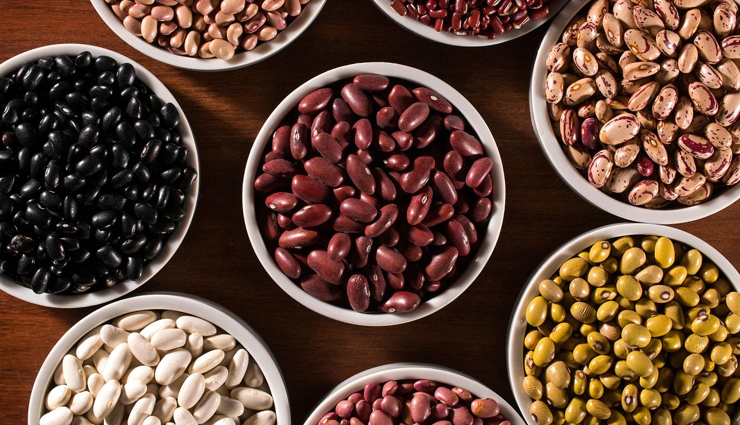
Beans are edible seeds or pods that come from various plants in the family Fabaceae. They are commonly classified as legumes and are widely cultivated and consumed around the world. Beans are known for their high protein and fiber content, as well as their nutritional value. They are a staple in many cuisines and are available in different shapes, sizes, and colors.
Beans are typically categorized into two main groups: "shell beans" or "snap beans," which are consumed when the pod is still immature and tender, and "dry beans," which are allowed to mature and dry on the plant before being harvested. Dry beans are the most common type consumed globally and are used in a variety of dishes, including soups, stews, salads, and side dishes.
Some of the most popular types of beans include kidney beans, black beans, chickpeas (garbanzo beans), navy beans, pinto beans, lentils, lima beans, adzuki beans, cannellini beans, and garbanzo beans (also known as chickpeas). Each type of bean has its unique flavor, texture, and culinary uses.
Beans are highly nutritious and offer several health benefits. They are an excellent source of plant-based protein, making them an important food for vegetarians and vegans. They are also rich in dietary fiber, which promotes healthy digestion and helps maintain a feeling of fullness. Beans contain a variety of vitamins and minerals, including folate, iron, potassium, and magnesium, which are essential for overall health and well-being. Today in this article, we will explore 10 different types of beans and delve into their specific health benefits, highlighting why they deserve a place in your healthy diet.
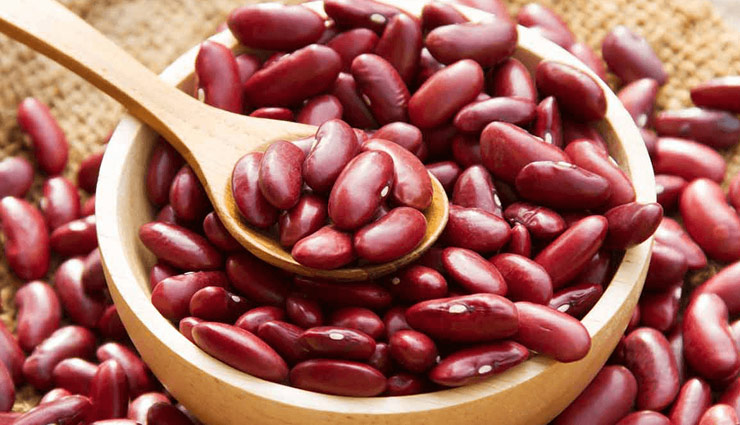
# Kidney Beans
Kidney beans are known for their distinct shape and vibrant red color. They are an excellent source of plant-based protein and dietary fiber, which aid in digestion and promote feelings of fullness. Kidney beans also provide essential minerals such as iron, magnesium, and potassium, contributing to overall heart health and proper muscle function. Here are 5 health benefits of kidney beans:
Rich in Fiber: Kidney beans are an excellent source of dietary fiber, both soluble and insoluble. This high fiber content helps promote healthy digestion, prevents constipation, and supports regular bowel movements. It also aids in maintaining stable blood sugar levels and can contribute to weight management by promoting feelings of fullness.
Plant-Based Protein: Kidney beans are a valuable source of plant-based protein, making them an excellent choice for vegetarians and vegans. Protein is essential for building and repairing tissues, supporting muscle growth, and maintaining overall health. Including kidney beans in your diet can help meet your protein needs in a nutritious and sustainable way.
Heart-Healthy Nutrients: Kidney beans are packed with heart-healthy nutrients. They are an excellent source of potassium, a mineral that helps regulate blood pressure and maintain a healthy cardiovascular system. Additionally, kidney beans are low in sodium and contain folate, which supports heart health by reducing homocysteine levels and promoting proper blood flow.
Antioxidant Content: Kidney beans are rich in antioxidants, including flavonoids and anthocyanins, which have been linked to various health benefits. Antioxidants help protect the body against oxidative stress caused by harmful free radicals. This can help reduce the risk of chronic diseases, including heart disease, certain cancers, and neurodegenerative disorders.
Blood Sugar Regulation: The combination of fiber and complex carbohydrates in kidney beans contributes to better blood sugar control. The soluble fiber in kidney beans slows down the digestion and absorption of carbohydrates, preventing rapid spikes in blood sugar levels. This can be particularly beneficial for individuals with diabetes or those at risk of developing the condition.
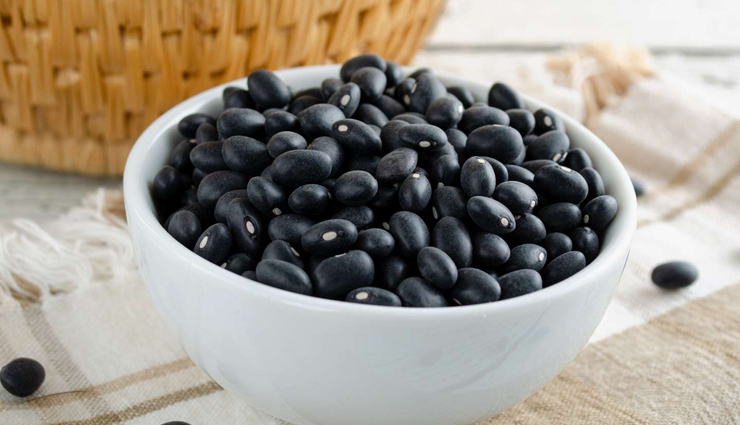
# Black Beans
Black beans have a rich and earthy flavor, making them a popular choice in various dishes. They are packed with antioxidants, particularly anthocyanins, which help protect against cell damage and reduce the risk of chronic diseases. Black beans also contain folate, which supports red blood cell production and aids in DNA synthesis. Here are 5 health benefits of black beans:
High in Fiber: Black beans are an excellent source of dietary fiber, containing both soluble and insoluble fiber. This fiber content helps promote healthy digestion, aids in maintaining regular bowel movements, and can contribute to a feeling of fullness, which may help with weight management. Consuming black beans regularly can support a healthy digestive system and prevent constipation.
Plant-Based Protein: Black beans are a great plant-based source of protein. They provide a significant amount of protein, making them an important addition to vegetarian, vegan, or plant-based diets. Protein is essential for various bodily functions, including muscle growth, repair, and overall health. Adding black beans to your meals can help meet your protein needs without relying solely on animal-based sources.
Antioxidant-Rich: Black beans are packed with antioxidants, including flavonoids and anthocyanins. These antioxidants help protect the body against oxidative stress and reduce the risk of chronic diseases such as heart disease, certain cancers, and neurodegenerative disorders. Including black beans in your diet can provide an antioxidant boost to support overall health and well-being.
Blood Sugar Regulation: Black beans have a low glycemic index, meaning they cause a slower and steadier rise in blood sugar compared to high-glycemic foods. The fiber and protein in black beans help slow down the digestion and absorption of carbohydrates, leading to more stable blood sugar levels. This can be beneficial for individuals with diabetes or those looking to manage their blood sugar levels.
Heart Health Support: Consuming black beans regularly can be beneficial for heart health. They are a good source of dietary fiber and contain important minerals like potassium and magnesium. These nutrients contribute to maintaining healthy blood pressure levels, reducing the risk of hypertension and cardiovascular diseases. Additionally, the fiber content of black beans helps lower LDL (bad) cholesterol levels, promoting a healthier lipid profile.

# Chickpeas (Garbanzo Beans)
Chickpeas are widely recognized for their role in hummus, but they offer more than just delicious dips. These legumes are an excellent source of plant-based protein, making them a valuable addition to vegetarian and vegan diets. Chickpeas are also high in dietary fiber, supporting digestive health and promoting satiety. Here are 5 health benefits of chickpeas:
High in Fiber: Chickpeas are an excellent source of dietary fiber. Both soluble and insoluble fiber are present in chickpeas, promoting healthy digestion, preventing constipation, and supporting regular bowel movements. The fiber content also helps maintain stable blood sugar levels and can contribute to weight management by promoting feelings of fullness.
Plant-Based Protein: Chickpeas are a rich source of plant-based protein, making them a valuable addition to vegetarian, vegan, or plant-based diets. Protein is essential for various functions in the body, including tissue repair, muscle building, and overall health. Incorporating chickpeas into your meals provides a protein boost without relying solely on animal-based sources.
Nutrient-Dense: Chickpeas are packed with essential vitamins and minerals. They are a good source of folate, iron, phosphorus, magnesium, and manganese. Folate is crucial for DNA synthesis and cell division, while iron is essential for oxygen transport and energy production. These nutrients play vital roles in supporting overall health and well-being.
Heart Health Support: Chickpeas can help with heart health. Their high fibre content aids in the reduction of LDL (bad) cholesterol levels and the risk of heart disease. Chickpeas also include potassium, which aids in blood pressure regulation, and magnesium, which promotes cardiovascular function. Chickpeas in your diet may assist support heart health.
Blood Sugar Regulation: Chickpeas have a low glycemic index, which means they raise blood sugar levels more slowly and gradually than high-glycemic meals. Chickpeas' fibre and protein content slows carbohydrate digestion and absorption, resulting in better blood sugar regulation. Individuals with diabetes or those trying to regulate their blood sugar levels may benefit from this.

# Navy Beans
Navy beans, also known as white beans, have a mild and creamy taste. They are an excellent source of dietary fiber and contain a wide range of minerals, including calcium, iron, and magnesium. Navy beans are often used in soups, stews, and casseroles, providing a hearty and nutritious base to these dishes. Here are five health benefits of navy beans:
High in Fiber: Navy beans are an excellent source of dietary fiber, containing both soluble and insoluble fiber. The fiber content helps promote healthy digestion, prevents constipation, and supports regular bowel movements. It also contributes to satiety, aiding in weight management and controlling appetite.
Heart-Healthy Nutrients: The heart-healthy elements found in navy beans are abundant. They are an excellent source of potassium, a mineral that supports blood pressure control and cardiovascular system health. A decreased risk of heart disease may result from the high fibre content of navy beans, which also lowers cholesterol levels, particularly LDL (bad) cholesterol.
Blood Sugar Regulation: The fibre and complex carbs in navy beans help to improve blood sugar regulation. A slower and more gradual release of glucose into the circulation results from the soluble fibre in navy beans, which slows down the digestion and absorption of carbs. People who already have diabetes or who are at risk of getting it can benefit the most from this.
Nutrient-Dense: Navy beans are a rich source of important nutrients. They are a good source of folate, which is necessary for cell growth and DNA synthesis. Additionally, navy beans include iron, magnesium, and manganese, which are vital for generating energy, ensuring that muscles are functioning properly, and supporting general health. These nutrients promote a number of biological processes and enhance general wellbeing.
Weight Management: Navy beans are low in calories but high in fibre and protein, making them a filling side dish. The fibre and protein content can aid in the promotion of fullness, the reduction of hunger, and the prevention of overeating. Incorporating navy beans into a well-balanced diet can help with weight control and the attainment and maintenance of a healthy body weight.
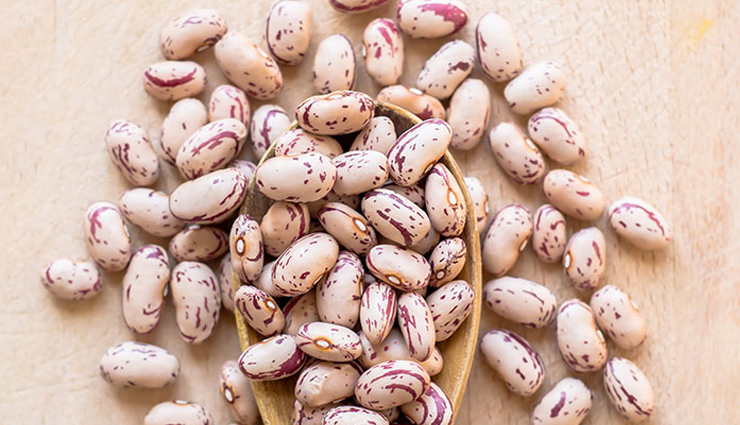
# Pinto Beans
Pinto beans are popular in Latin American cuisine and have a delicate, earthy flavor. These beans are rich in folate, a B-vitamin essential for cell growth and development. They are also a good source of potassium, which helps regulate blood pressure, and manganese, an important mineral for bone health. Here are 5 health benefits of pinto beans:
High in Fiber: Pinto beans are an excellent source of dietary fiber. Fiber aids in digestion, promotes regular bowel movements, and helps maintain a healthy digestive system. Consuming foods rich in fiber, like pinto beans, can help prevent constipation, support weight management, and contribute to a feeling of fullness.
Plant-Based Protein: Pinto beans are a great source of plant-based protein. They provide a substantial amount of protein, making them a valuable addition to vegetarian, vegan, or plant-based diets. Protein is essential for building and repairing tissues, supporting muscle growth, and overall health. Including pinto beans in your diet helps meet your protein needs without relying solely on animal-based sources.
Nutrient-Dense: Pinto beans are packed with important nutrients. They contain essential vitamins and minerals such as folate, iron, magnesium, potassium, and zinc. Folate is vital for DNA synthesis and cell division, while iron is essential for oxygen transport in the body. These nutrients play critical roles in supporting overall health and well-being.
Heart Health Support: Pinto beans contribute to heart health in several ways. Their high fiber content helps reduce LDL (bad) cholesterol levels, promoting a healthy lipid profile and reducing the risk of heart disease. Pinto beans are also a good source of potassium, which helps regulate blood pressure and maintain a healthy cardiovascular system.
Blood Sugar Regulation: Pinto beans have a low glycemic index, which means they promote a gradual rise in blood sugar levels. Pinto beans' mix of fibre and complex carbs delays glucose digestion and absorption, resulting in better blood sugar regulation. This is especially useful for people who have diabetes or want to control their blood sugar levels.
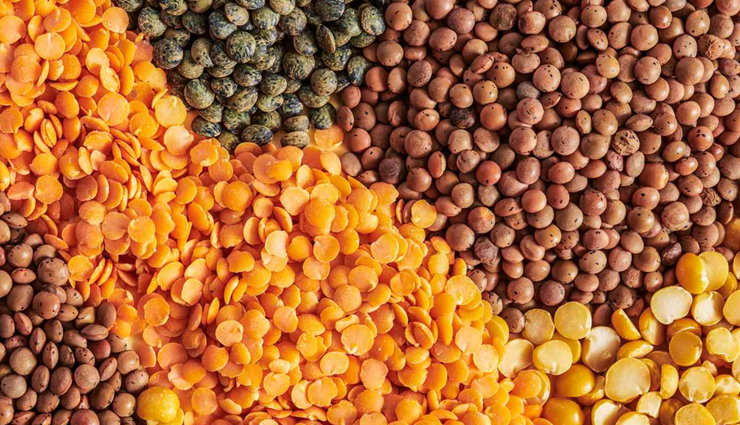
# Lentils
Lentils come in various colors, including red, green, and brown, each with its unique flavor and texture. These legumes are high in protein and fiber, making them a valuable choice for plant-based diets. Lentils are also a great source of folate, iron, and potassium, promoting cardiovascular health and supporting proper nerve function. Here are 5 health benefits of lentils:
Rich in Nutrients: Lentils are packed with essential nutrients. They are an excellent source of plant-based protein, making them a valuable option for vegetarians, vegans, or those looking to reduce their meat consumption. Lentils are also rich in dietary fiber, iron, folate, magnesium, and potassium. These nutrients support overall health, energy production, and the proper functioning of various bodily systems.
High in Fiber: Lentils are a great source of dietary fiber, including both soluble and insoluble fiber. The fiber content helps promote healthy digestion, prevents constipation, and supports regular bowel movements. Lentils also have a low glycemic index, which means they cause a slow and steady rise in blood sugar levels, making them a suitable choice for individuals with diabetes or those looking to manage their blood sugar levels.
Heart Health Support: Lentils have been associated with a reduced risk of heart disease. Their high fiber content helps lower LDL (bad) cholesterol levels, which is crucial for maintaining cardiovascular health. Lentils are also a good source of potassium, which supports healthy blood pressure levels and reduces the risk of hypertension.
Blood Sugar Regulation: The combination of fiber and complex carbohydrates in lentils contributes to better blood sugar control. The soluble fiber in lentils slows down the digestion and absorption of carbohydrates, leading to a more gradual release of glucose into the bloodstream. This helps stabilize blood sugar levels and can be beneficial for individuals with diabetes or those aiming to manage their blood sugar.
Weight Management: Lentils are nutrient-dense and low in calories, making them a satisfying addition to meals. The high fiber and protein content of lentils promote feelings of fullness, reduce appetite, and support weight management. Including lentils in your diet can help you maintain a healthy body weight and prevent overeating.

# Lima Beans
Lima beans, also known as butter beans, have a delicate buttery flavor and creamy texture. They are an excellent source of dietary fiber, promoting digestive health and regulating blood sugar levels. Lima beans are also rich in molybdenum, a trace mineral that aids in detoxification and metabolism of certain substances in the body. Here are five health benefits of lima beans:
High in Fiber: Lima beans are an excellent source of dietary fiber. Fiber aids in digestion, promotes regular bowel movements, and helps maintain a healthy digestive system. Adequate fiber intake is also associated with a reduced risk of heart disease, stroke, and certain types of cancer. Including lima beans in your diet can help meet your daily fiber needs.
Plant-Based Protein: Lima beans are a good source of plant-based protein. They provide a substantial amount of protein, making them a valuable option for individuals following vegetarian, vegan, or plant-based diets. Protein is essential for various functions in the body, including tissue repair, muscle growth, and overall health.
Nutrient-Dense: Lima beans are packed with essential nutrients. They are rich in folate, iron, manganese, and potassium. Folate is important for DNA synthesis and cell division, while iron is essential for oxygen transport and energy production. Manganese supports bone health and metabolism, while potassium helps regulate blood pressure and maintain a healthy cardiovascular system.
Heart Health Support: Lima beans can contribute to heart health. Their high fiber content helps reduce LDL (bad) cholesterol levels, which is beneficial for cardiovascular health. Lima beans also contain potassium, which helps regulate blood pressure, and magnesium, which supports heart function. Including lima beans in your diet can promote a healthy heart and reduce the risk of heart disease.
Blood Sugar Regulation: Lima beans' high fibre content slows down the breakdown and absorption of carbs, causing glucose to enter the circulation more gradually. This can reduce spikes and dips in blood sugar levels and help manage them. Lima beans are a good option for people with diabetes or those trying to control their blood sugar levels because of their relatively low glycemic index.
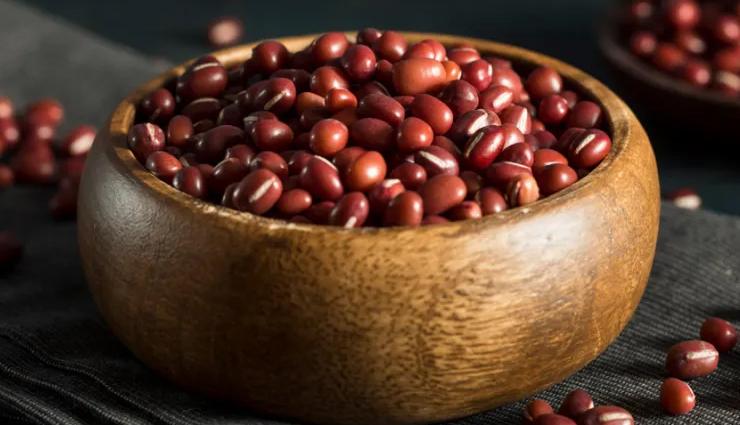
# Adzuki Beans
Adzuki beans are commonly used in Asian cuisine and have a slightly sweet flavor. These beans are rich in antioxidants, which help combat free radicals and reduce inflammation. Adzuki beans also contain beneficial enzymes that aid in digestion and contribute to gut health. Here are 5 health benefits of adzuki beans:
Nutrient-Dense: Adzuki beans are packed with essential nutrients. They are a rich source of protein, dietary fiber, folate, potassium, iron, and magnesium. Protein is important for building and repairing tissues, while dietary fiber promotes healthy digestion and helps maintain a healthy weight. Adzuki beans also contain various vitamins and minerals that support overall health and well-being.
Digestive Health: Adzuki beans are high in dietary fiber, which supports a healthy digestive system. Fiber helps prevent constipation, promotes regular bowel movements, and supports the growth of beneficial gut bacteria. Including adzuki beans in your diet can help maintain a healthy gut and prevent digestive issues.
Blood Sugar Regulation: The low glycemic index of adzuki beans means they cause a slower and more gradual increase in blood sugar levels compared to high-glycemic foods. The combination of fiber and complex carbohydrates in adzuki beans helps regulate blood glucose levels, making them a suitable option for individuals with diabetes or those looking to manage their blood sugar levels.
Heart Health Support: Adzuki beans can contribute to heart health. Their high fiber content helps reduce LDL (bad) cholesterol levels, which is beneficial for cardiovascular health. Adzuki beans are also a good source of potassium, which helps regulate blood pressure and maintain a healthy heart. Consuming adzuki beans as part of a balanced diet can help support a healthy cardiovascular system.
Antioxidant Properties: Adzuki beans contain antioxidants that help protect the body against oxidative stress and inflammation. These antioxidants, such as flavonoids and anthocyanins, have been linked to various health benefits, including reduced risk of chronic diseases such as heart disease, cancer, and neurodegenerative disorders.
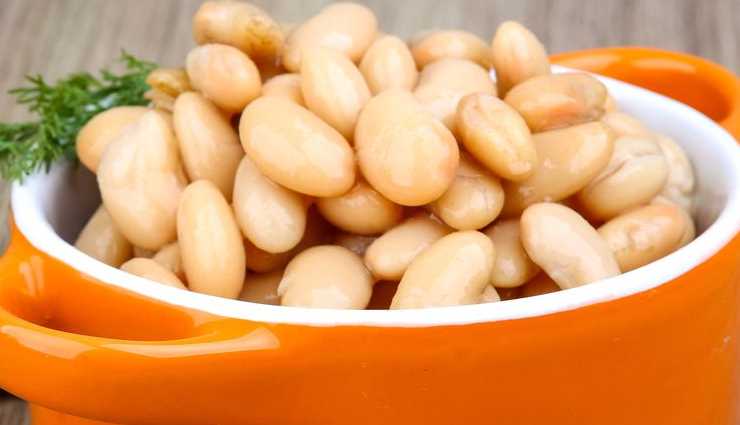
# Cannellini Beans
Cannellini beans have a mild and nutty taste. They are a good source of both protein and fiber, making them a satisfying addition to meals. Cannellini beans are also rich in folate, magnesium, and potassium, supporting heart health and promoting proper muscle function. Here are 5 health benefits of cannellini beans:
Rich in Fiber: Cannellini beans are an excellent source of dietary fiber. Fiber aids in digestion, promotes regular bowel movements, and helps maintain a healthy digestive system. Consuming foods rich in fiber, like cannellini beans, can help prevent constipation, support weight management, and promote a feeling of fullness.
Plant-Based Protein: Cannellini beans are a great source of plant-based protein. They provide a significant amount of protein, making them an important addition to vegetarian, vegan, or plant-based diets. Protein is essential for building and repairing tissues, supporting muscle growth, and overall health. Including cannellini beans in your diet helps meet your protein needs without relying solely on animal-based sources.
Low in Fat: Cannellini beans are naturally low in fat, particularly saturated fat. This makes them a healthy choice for individuals looking to reduce their intake of saturated fats, which are associated with increased risk of heart disease. Consuming cannellini beans as part of a balanced diet can help support heart health and overall well-being.
Nutrient-Dense: Cannellini beans are packed with important nutrients. They are a good source of folate, which is important for DNA synthesis and cell division. Cannellini beans also contain iron, magnesium, and potassium, which are essential for energy production, proper muscle function, and maintaining overall health. These nutrients support various bodily functions and contribute to overall well-being.
Blood Sugar Regulation: Cannellini beans have a low glycemic index, which means they cause a slower and steadier rise in blood sugar levels compared to high-glycemic foods. The combination of fiber and complex carbohydrates in cannellini beans helps regulate blood sugar levels, making them a suitable choice for individuals with diabetes or those looking to manage their blood sugar levels.
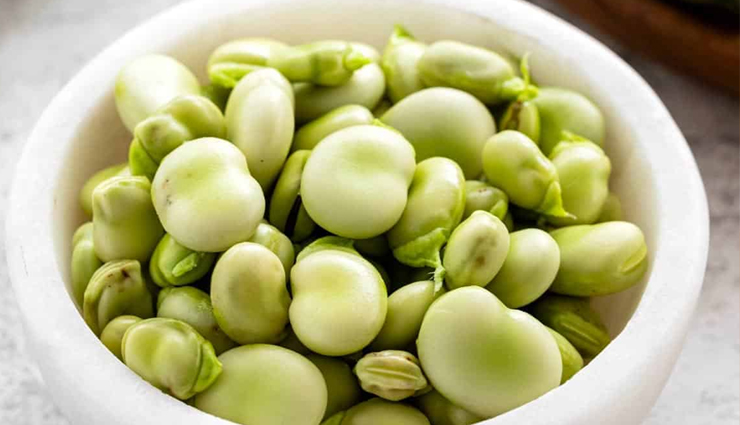
# Fava beans
Fava beans, also known as broad beans, are a type of legume that belong to the pea family. They have a long history of cultivation and are widely consumed in many cultures around the world. Fava beans are known for their distinctive flavor and buttery texture. Here are 5 health benefits of fava beans:
Nutrient-Rich: Fava beans are packed with essential nutrients. They are an excellent source of folate, manganese, copper, phosphorus, and magnesium. Folate is important for DNA synthesis and cell division, while manganese and copper support various enzymatic reactions in the body. Fava beans also provide a good amount of protein, dietary fiber, and vitamins such as vitamin K and vitamin C.
Heart Health Support: Fava beans can contribute to heart health. They are low in saturated fat and cholesterol, making them a heart-healthy food choice. Fava beans also contain nutrients like folate, which helps reduce homocysteine levels and lower the risk of heart disease. Additionally, their fiber content helps regulate cholesterol levels and maintain healthy blood pressure, further supporting cardiovascular health.
High in Fiber: Fava beans are a great source of dietary fiber, both soluble and insoluble. Fiber promotes healthy digestion, prevents constipation, and supports regular bowel movements. It also helps control appetite, contributing to a feeling of fullness and aiding in weight management. The fiber in fava beans can also help regulate blood sugar levels and improve insulin sensitivity.
Antioxidant Properties: Fava beans are rich in antioxidants, including flavonoids and polyphenols. These compounds help protect the body against oxidative stress and inflammation, which are associated with chronic diseases such as heart disease, cancer, and neurodegenerative disorders. Consuming fava beans as part of a balanced diet can contribute to overall antioxidant defense.
Bone Health: Fava beans contain minerals like manganese, phosphorus, and magnesium, which are important for bone health. These minerals help maintain bone density, support bone structure, and contribute to the overall strength and integrity of the skeletal system. Including fava beans in your diet can be beneficial for individuals of all ages, particularly in promoting healthy bone development and preventing conditions like osteoporosis.





